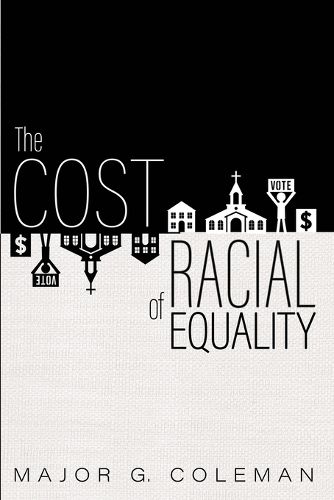Readings Newsletter
Become a Readings Member to make your shopping experience even easier.
Sign in or sign up for free!
You’re not far away from qualifying for FREE standard shipping within Australia
You’ve qualified for FREE standard shipping within Australia
The cart is loading…






This title is printed to order. This book may have been self-published. If so, we cannot guarantee the quality of the content. In the main most books will have gone through the editing process however some may not. We therefore suggest that you be aware of this before ordering this book. If in doubt check either the author or publisher’s details as we are unable to accept any returns unless they are faulty. Please contact us if you have any questions.
Knowing the cost of products is important. If you don't know how much your item costs, whatever it may be, you are likely to be overcharged or under-protected. Racial equality is very much like any product. Generally, you get what you pay for--assuming you are buying well-made products from reputable and professional sources. The more you pay, the more you get; the less you pay, the less you get. But everyone knows there are often wild exceptions to the general rule of getting what you pay for. Racial equality is no exception. Some low-cost racial equality programs provide tremendous bang for the buck. K-12 school integration, affirmative action in higher education, funding for anti-discrimination enforcement, and political equality in voting are just a few examples. However, by refusing to calculate the costs involved and choosing to pay little or nothing for racial equality, the nation is defaulting to the highest cost options. This is like trying to save money on transportation by not changing the oil in your car. Racial equality cost decisions are particularly problematic as the nation moves to being majority-minority by mid-century. Not knowing the costs for racial equality threatens American democracy.
$9.00 standard shipping within Australia
FREE standard shipping within Australia for orders over $100.00
Express & International shipping calculated at checkout
Stock availability can be subject to change without notice. We recommend calling the shop or contacting our online team to check availability of low stock items. Please see our Shopping Online page for more details.
This title is printed to order. This book may have been self-published. If so, we cannot guarantee the quality of the content. In the main most books will have gone through the editing process however some may not. We therefore suggest that you be aware of this before ordering this book. If in doubt check either the author or publisher’s details as we are unable to accept any returns unless they are faulty. Please contact us if you have any questions.
Knowing the cost of products is important. If you don't know how much your item costs, whatever it may be, you are likely to be overcharged or under-protected. Racial equality is very much like any product. Generally, you get what you pay for--assuming you are buying well-made products from reputable and professional sources. The more you pay, the more you get; the less you pay, the less you get. But everyone knows there are often wild exceptions to the general rule of getting what you pay for. Racial equality is no exception. Some low-cost racial equality programs provide tremendous bang for the buck. K-12 school integration, affirmative action in higher education, funding for anti-discrimination enforcement, and political equality in voting are just a few examples. However, by refusing to calculate the costs involved and choosing to pay little or nothing for racial equality, the nation is defaulting to the highest cost options. This is like trying to save money on transportation by not changing the oil in your car. Racial equality cost decisions are particularly problematic as the nation moves to being majority-minority by mid-century. Not knowing the costs for racial equality threatens American democracy.